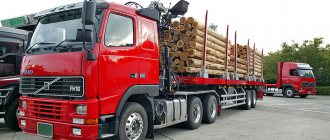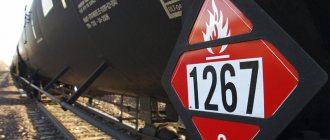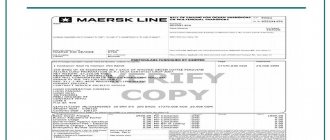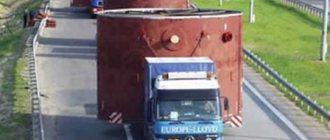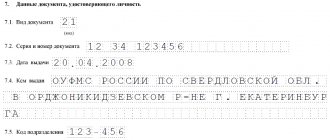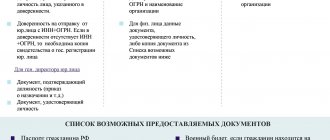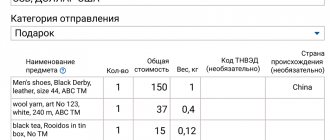ADR kit is a set of mandatory equipment and personal protective equipment for the crew of a vehicle transporting dangerous goods ( ADR ). ADR sets differ:
- By class of dangerous goods transported
- By crew size
- By cost and number of incoming components
All ADR kits are developed and completed in strict accordance with ADR 2019 .
What classes of ADR sets are there?
- Class 1.1
- Class 1.2
- Class 1.3
- Class 1.4
- Class 1.5
- Class 1.6
- Class 2.1
- Class 2.2
- Class 2.3
- Class 3
- Class 4.1
- Class 4.2
- Class 4.3
- Class 5.1
- Class 5.2
- Class 6.1
- Class 6.2
- Class 7
- Class 8
- Class 9
- Universal - for truck
ADR set for hazard classes 1.1, 1.2, 1.3, 1.4, 1.5, 1.6, 2.1, 2.2
What is included in the ADR class 1.1, 1.2, 1.3, 1.4, 1.5, 1.6, 2.1, 2.2 kit?
- Safety glasses - 1 piece
- Protective gloves - 1 piece
- Vest - 1 piece
- Portable lantern - 1 piece
- Danger sign - 2 pcs
- Emergency lamp - 2 pcs.
- Battery 4R25-2 pcs
- Written instructions for ADR - 1 piece
What are they?
- Base
- Standard
- Advanced
For a crew of 2 people
- Base
- Standard
- Advanced
Varieties
As mentioned earlier, an ADR kit is a number of elements of additional equipment and means designed for the direct, passive protection of people involved in the transportation of dangerous goods by rail and road transport.
The definition and quantity of components depends on the classification of the transported cargo.
It should be taken into account that periodic additions and changes to this list are subject to revision every 2 years. This is being done by specialists from the international working group WP17 WP18. The latest version was introduced on 01/01/2017 and will be valid until 12/31/2018 inclusive.
After which new conditions for improving the composition will come into force. At the moment, according to the text of this appendix, the options shown in the image are included in the category that does not belong to any of the ADR classes:
The classification of ADR directly affects the components of the kit and is carried out in accordance with the characteristics applicable to ADR, indicated by the corresponding plates presented below.
They are individual for each individual class:
- The first is explosives, which are characterized by explosion, combustion or other pyrotechnic effect.
This category, in turn, is divided into 6 subclasses: - The second is gas having the following characteristics:
- liquefied;
- compressed;
- cooled, dissolved under pressure.
- The third is flammable liquids and mixtures, which have a similar structure. They are divided into 3 categories of subgroups, distinguished by different ignition temperatures.
- The fourth is flammable materials and substances that do not have explosive properties in the form of 3 subclasses shown in the image.
- Fifth - oxidizing, characteristic of supporting the combustion of fire by releasing oxygen.
- Sixth - poisonous.
- The seventh is radioactive.
- Eighth – caustic, corrosive.
- Ninth - other hazardous substances and products.
Based on this structured list, the classification of ADR sets required for transportation by road and rail is determined.
ADR set for hazard class 2.3
What is included in the ADR class 2.3 kit?
- Safety glasses - 1 piece
- Protective gloves - 1 piece
- Vest - 1 piece
- Full face mask – 1
- Mask filter - 1
- Portable lantern - 1 piece
- Danger sign - 2 pcs
- Emergency lamp - 2 pcs.
- Battery 4R25-2 pcs
- Written instructions for ADR - 1 piece
What are they?
- Base
- Standard
- Advanced
For a crew of 2 people
- Base
- Standard
- Advanced
What it is
The term ADR kit refers to a set of necessary items that must be present on any vehicle transporting hazardous substances falling under the ADR classification.
Before talking about its composition, it is necessary to clarify these 2 abbreviated terms:
- “European Agreement on Transport of Dangerous Goods on Road” (ADR) translated from French means the European agreement on the transport of dangerous goods.
- ADR is an international agreement concerning general rules for the transport of dangerous goods, formulated in Switzerland by the UN Economic Commission for Europe.
ADR set for hazard classes 3, 4.1, 4.3, 8, 9
What is included in the ADR class 3, 4.1, 4.3, 8, 9 kit?
- Safety glasses - 1 piece
- Oil and petrol resistant protective gloves - 1 piece
- Eye wash solution - 1 piece
- Vest - 1 piece
- Portable lantern - 1 piece
- Spark-proof shovel - 1 pc.
- Danger sign - 2 pcs
- Emergency lamp - 2 pcs.
- Battery 4R25-2 pcs
- Written instructions for ADR - 1 piece
- Drainage trap - 1 piece
- Container for the trap - 1 piece
What are they?
- Base
- Standard
- Advanced
For a crew of 2 people
- Base
- Standard
- Advanced
Criterias of choice
As mentioned earlier, according to the international requirements of ADR, the ADR configuration is determined by:
- based on the belonging of the transported cargo to a certain hazard class described earlier. Thus, the list of required components is compiled individually for each trip;
- in order to increase consumer demand, so-called economy kits are available for sale, implying universal use, relating to most categories;
- ADR implies and requires carriers to carry only a number of items that may become necessary in an emergency. However, this list is minimal since the above-mentioned elements are not always enough to localize the leakage of part of the cargo or prevent another dangerous situation. Based on this, a number of logistics enterprises, along with companies specializing in the circulation of substances belonging to one of the groups of ADR, impose separate, additional conditions on this situation. Moreover, they are not mandatory in particular under Russian and international legislation, but are considered indispensable according to the internal rules of the organization.
The incorrect use or absence of an ADR kit on a vehicle transporting dangerous goods can turn into a serious problem, which in turn will have serious consequences for others:
- Driver death or injury.
- Partial or complete loss of cargo for the shipper.
- Financial losses for the carrier company associated with compensation for damage to the owner of the cargo.
- Hazards to others (depending on the classification of the hazardous substance).
- Causing irreversible damage to the environment, climate, flora and fauna.
ADR set for hazard classes 4.2, 5.1, 5.2, 6.2, 7
What is included in the ADR class 4.2, 5.1, 5.2, 6.2, 7 kit?
- Safety glasses - 1 piece
- Protective gloves - 1 piece
- Eye wash solution - 1 piece
- Vest - 1 piece
- Portable lantern - 1 piece
- Danger sign - 2 pcs
- Emergency lamp - 2 pcs.
- Battery 4R25-2 pcs
- Written instructions for ADR - 1 piece
What are they?
- Base
- Standard
- Advanced
For a crew of 2 people
- Base
- Standard
- Advanced
ADR set for hazard class 6.1
What is included in the ADR class 6.1 kit?
- Safety glasses - 1 piece
- Protective gloves - 1 piece
- Eye wash solution - 1 piece
- Vest - 1 piece
- Full face mask – 1
- Mask filter - 1
- Portable lantern - 1 piece
- Danger sign - 2 pcs
- Emergency lamp - 2 pcs.
- Battery 4R25-2 pcs
- Written instructions for ADR - 1 piece
What are they?
- Base
- Standard
- Advanced
For a crew of 2 people
- Base
- Standard
- Advanced
User's Manual
First of all, it should be noted that a number of protective equipment and other elements included in the ADR kit have an expiration date. For example, eye wash or a replaceable modular filter for a gas mask.
Therefore, it is recommended to pay attention to this at the time of purchase and during use. In most cases, hazardous substances are labeled on the packaging or instructions for use.
The article: Transportation of liquid cargo by road will tell you how petroleum products are transported by road. Read the rules for accepting applications for the transportation of goods by rail here.
The procedure for using the elements from the ADR kit is not complicated, since it mainly consists of fairly primitive elements that anyone can use. For example, a shovel, protective items for a person, a bright tape to mark the danger zone from the entry of strangers.
Of the entire list, the most complex technical device is a fire extinguisher, instructions for use of which are given in the diagram shown in the photo:
Its operating principle is as follows:
- at the moment the shut-off and starting device is activated, the stopper located in the neck breaks through and the gas pumped into its body under pressure squeezes out the powder, stopping the combustion process;
- this is done by densely covering the ignited area and blocking the access of oxygen, which leads to its extinguishing;
- the amount of substance released is regulated by increasing or decreasing the pressure on the handle - the holder at the top of the fire extinguisher.
As for the other products included in the composition, the process here is simpler:
- Glasses are designed to protect the cornea from small particles of debris or chemically active substances.
- The vest does not play a protective role in the fight against the leakage and spread of chemicals, but it performs a function that protects the person wearing it from being crushed by a passing vehicle, that is, it makes it better visible even in the dark.
- The technique of using a gas mask involves its use as a result of heavy smoke or leakage of toxic gases from a reservoir.
- A low-voltage diode flashlight is used at night. And not only to eliminate an emergency situation, but also for regular walk-throughs and inspections performed in the dark.
- Rollbacks are used to prevent spontaneous movement of a car parked on an uneven area.
Summary comparison table of ADR kits
| Name | 1.1-1.6;2.1;2.2 | 2.3 | 3;4.1;4.3;8;9 | 4.2;5.1;5.2;6.2;7 | 6.1 | |||||
| Number of crew members | 1 | 2 | 1 | 2 | 1 | 2 | 1 | 2 | 1 | 2 |
| Safety glasses | 1 | 2 | 1 | 2 | 1 | 2 | 1 | 2 | 1 | 2 |
| Protective gloves | 1 | 2 | 1 | 2 | 1 | 2 | 1 | 2 | 1 | 2 |
| Eye wash solution | — | — | — | — | 1 | 2 | 1 | 2 | 1 | 2 |
| Signal vest EN 471 | 1 | 2 | 1 | 2 | 1 | 2 | 1 | 2 | 1 | 2 |
| Full face mask | — | — | 1 | 2 | — | — | — | — | 1 | 2 |
| Filter for mask | — | — | 1 | 2 | — | — | — | — | 1 | 2 |
| Portable flashlight | 1 | 2 | 1 | 2 | 1 | 2 | 1 | 2 | 1 | 2 |
| Spark-proof shovel | — | — | — | — | 1 | 1 | — | — | — | — |
| Danger sign/emergency lamp | 2 | 2 | 2 | 2 | 2 | 2 | 2 | 2 | 2 | 2 |
| Written instructions for ADR | 1 | 1 | 1 | 1 | 1 | 1 | 1 | 1 | 1 | 1 |
| ADR bag | 1 | 1 | 1 | 1 | 1 | 1 | 1 | 1 | 1 | 1 |
| Drainage trap | — | — | — | — | 1 | 1 | — | — | — | — |
| Container to trap | — | — | — | — | 1 | 1 | — | — | — | — |
| Additionally | — | — | — | — | — | — | — | — | — | — |
| Helmet | 1 | 2 | 1 | 2 | 1 | 2 | 1 | 2 | 1 | 2 |
| Overalls | 1 | 2 | — | — | 1 | 2 | 1 | 2 | 1 | 2 |
| Boots | 1 | 2 | — | — | 1 | 2 | 1 | 2 | 1 | 2 |
